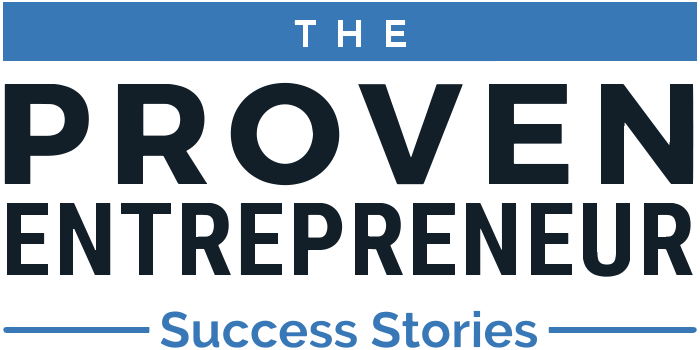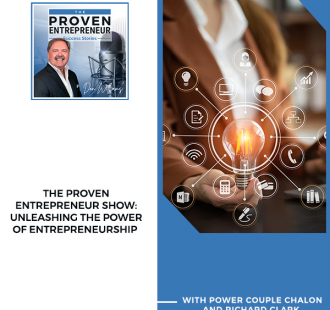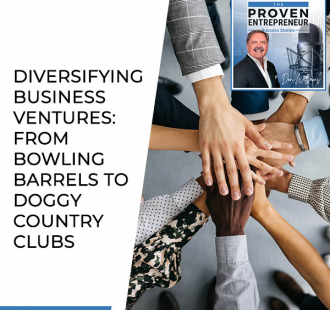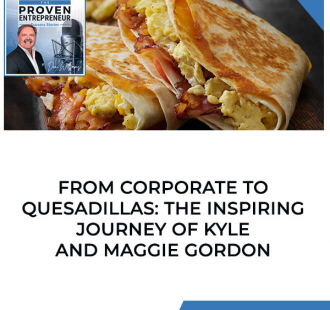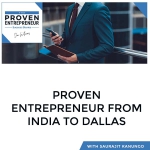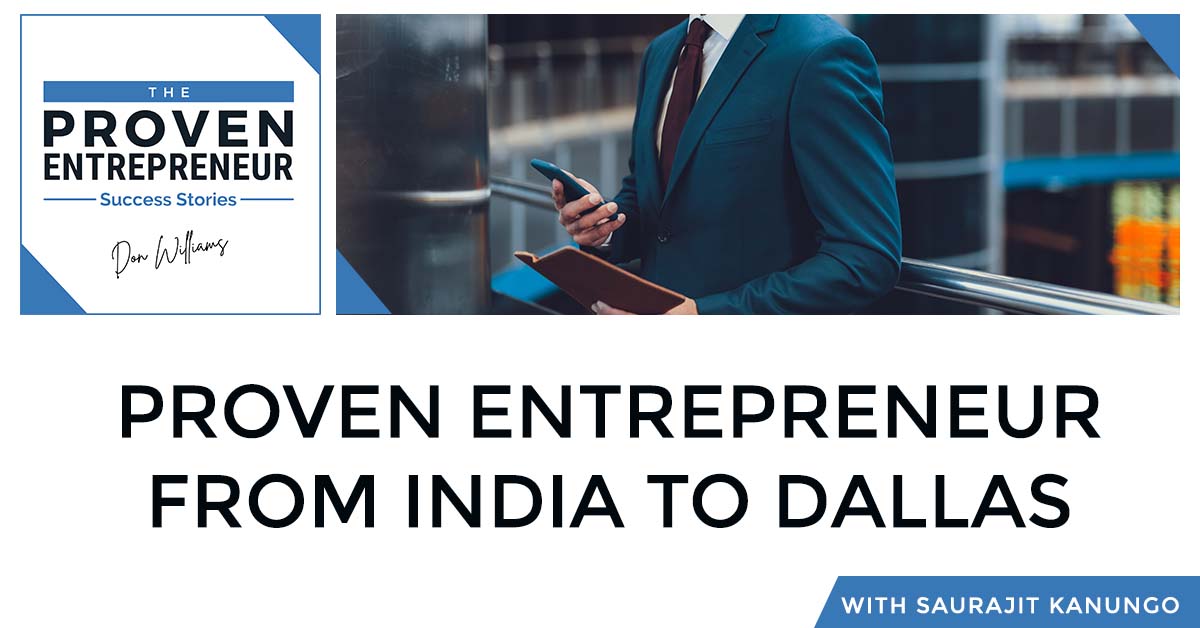
All progress starts with a yes. Today’s proven entrepreneur proves that. Saurajit Kanungo grew up in India with no entrepreneurial background in his family. From there, he went on to become a successful IT entrepreneur in Texas. He shares the crucial events that happened in between in this interview with Don Williams. In this conversation, we learn how Saurajit’s willingness to do more and achieve more allowed him to become a leading entrepreneur in his industry today. He also shares some of the biggest lessons in entrepreneurship and business leadership that he has learned over the years. Join in and learn the power of hard work and perseverance in this episode of The Proven Entrepreneur.
For information on how to work with Don visit Work With Don WilliamsYou can also reach out to Don Williams at https://donwilliamsglobal.comPlease join Don and his businesses in support of St. Jude’s Children Research Hospital in its Mission to cure Childhood Cancers. You can donate to St. Jude at stjude.org/donate
—
Listen to the podcast here
Saurajit Kanungo – Proven Entrepreneur From India To Dallas
All Progress Starts With A Yes…
I have my very good friend and you’re going to love him, Saurajit Kanungo from Capelle and Owner and Founder of Cyber Group, which is a software development IT company. Welcome, Saurajit.
Thank you, Don. I’m glad to be here.
We’re thrilled that you’re here. This is your success story, which typically, I’ll ask you if there’s a failing in there and there generally is somewhere. Let’s go back to when you were a young boy. In the household where you were raised, your parents, your grandparents, was someone entrepreneurial?
No one.
No entrepreneurial example as a young child?
Not at all. It never even came to mind.
Many people believe that entrepreneurs are raised in entrepreneurial homes but to me, I find this about half and half. Some were and some weren’t but there is wiring, maybe at birth that predisposes you to entrepreneurship. In my first paying job, I mowed the yard, not because I got paid but because there were consequences if I didn’t mow the yard. That doesn’t count. Not those kinds of jobs but what was your first paying job?
My first paying job was when I was doing my chartered accounting in India, which is like CPA here. We have to work for an accounting firm like Arthur Andersen or KPMG. It was almost like an indentured servant for three years but they do pay some stipend to cover your gas money and stuff like that.
It was outside of normal US employment law because it was normal Indian employment law.
I could clip about it but I learned a lot because in those three years when I became a chartered accountant, I was very comfortable reading the financial statement and P&L and auditing books.
When there’s a will, there’s a way. If we work hard and we’re disciplined, we can navigate all the challenges that are being put before us. Click To TweetMany entrepreneurs have very strong finance backgrounds and then there are entrepreneurs like me who when I started could not spell P&L. I had to learn everything along the way. It comes in all flavors. You were born and raised in India. What part of India?
I’m from South Eastern part of India. It’s a nice coastal state with 200 miles of blue ocean coastline.
Many people in America probably don’t picture that India has a coastline but they have a lot. After chartered accounting, when did you come to the US?
I came to the US in 1998 to do my second Master’s in Information Systems. If I can tell you a little bit about the transition, you would think that I had all it planned and I’m executing the plan. My plan around my studies and career has been more zig and zag than anything but a straight line but I’m glad it is that way. I was always a studious person. I’m always top three in the class.
I chose to do my major in Physics because that’s the hardest subject arguably. I finished my Physics undergrad and was number three in the university, not just in my college. I was red carpeted to do my Master’s in Physics and PhD. I’m at the university for a couple of months. I’m a social person. I’m interacting with people. I found to my dismay that there are unemployed physics and PhD students.
They are brilliant people. I’m like, “I don’t want to be that.” There is a backlog in the university. There are not enough jobs for a professor. They’re going to get their chance. I’m like, “I am not going to take that chance.” I called my dad. I’m like, “I don’t know what I’m going to do but I’m going to quit doing this so hang tight.” I scouted in my family and friends network who is doing what. My criteria, believe it or not, is who makes the most money?
They said, “There is something called a chartered accountant. The graduation percentage is less than 1% but if you get through that, you’re going to write your job description and offer letter.” I’m like, “Sign me up.” He says, “You don’t have a commerce or a business background.” I’m like, “Is it harder than physics?” “No, but it’s different.” “Different is good.” I went right through it. Typically, on average in India to complete chartered accountancy is between 5 to 6 years.
I completed the whole thing including my indentured servant tenure in three and a half years. I joined a pretty large company in Bombay. We had 60,000 employees and we own 5 major international airports in India. Delhi, Mumbai, Madras, known as Chennai, Kolkata and Trivandrum. I went into finance and accounting, as you can expect. The EDP, Electronic Data Processing, was a part of finance and accounting.
I inherited accidentally a bunch of programmers. They were trying to automate our accounting systems like payrolling and general ledger accounts payable and accounts receivable. I always hung out with them and teach them. When they are trying to write programming code, they don’t understand what a journal entry and a sub-ledger are so I teach them. I come to realize I started managing this project. It was massive automation. I got fascinated with the whole information system. I’m going to go to the US to do my second Master’s and that’s what I’m going to major in. That’s a little bit of the story.

Two things stand out. All progress starts with a yes. You were exposed to something and you said, “Yes, I’m going to do this and I love that.” The other is that great leaders have the ability to have difficult conversations. I’m trying to picture the conversation between you and your father when you said, “Dad, I’m not going down this path.” I have a very good friend in Oklahoma City. His parents were first-generation US from India and he said, “In my household, I had three choices, doctor, engineer or disappointment.” That was it.
Unfortunately, my dad said, “I’ll support you on whatever you want to do.” I had an issue with my mom. She’s the same mindset. “I thought you were going to do your Master’s and go for Indian administrative services,” which is a very coveted exam. I’m like, “Sorry, mom. That’s a lot of uncertainty. I don’t want to.” She was disappointed for a year or something but I had the support of my dad which I’m very thankful for.
Still, you’re entering that conversation, not knowing how it’s going to go. A good leader will run to the fire and be able to use words in a way that everybody can walk away intact. You’re still in India but you come to the US and do your masters in IT. Where do you do that?
You know that we have to appear in GMAT before we could apply to a business school. I’m not a native English-speaking so I had to also appear in another test called TOEFL, the Test of English as a Foreign Language. On GMAT, I had 97%. Any university I applied to will take me in but UT Arlington was gracious to offer me a full ride. The deal was that I would teach two undergrad classes. They offered me a full ride and a little bit of stipend for me to survive. I ended up in UT Arlington and got out of my Master’s with zero debt.
Contextually, at that time, $1 was worth 45 Indian Rupees. Even if I had a little bit of money saved up for my work in Bombay, when I converted that, it was not even enough for my first-semester tuition. A little bit of context. I’m a believer that when there is a will, there is a way. I hear people talk about how student loan is a big issue and it is a big issue. A college education is expensive and it is expensive but my mindset is we can complain about it or figure out a way that we could accept that it is expensive and difficult but if we work hard and we discipline, we can navigate those challenges that are put before us.
In certain studies, almost all graduates have significant physicians. Most physicians exit medical school with significant doubt. That has been the way since but they figure a way to make it work. We could certainly stand some more of that. You got to Arlington, Texas from India. It was a little different.
A little different but a lot similar.
Tell me about it.
The fortunate part is I spent seven years in Mumbai, India. Mumbai is the Wall Street of India. Believe it or not, it’s very Western work culture. Where I grew up in the South Eastern part of India, it’s anything about Western culture. I was fortunate. I had my ideas about Texas. I was thinking of Texas and Southern state. I’m a big fan of Margaret Mitchell when I read her book, Gone with the Wind when I was probably in eighth grade. I also like cotton fields, cowboys and horses. That was my view. I was fascinated. I land DFW in 1998. It adds cosmopolitan and diversity. I’d never expected that.
Let's try to replace the word “problem” with “opportunity.” You will be amazed how the energy is going to be much more positive. Click To TweetThink about culture shock including work culture. I had minimal difficulty if that makes any sense. I was fortunate that Bombay prepared me very well. You touched on something if I may. When I came to the US, I had my idea of what I wanted to be. It was anything but being an entrepreneur. Why do I say that? I did very well with the 60,000-employee corporation and got promoted ahead of many people at a very young age. I embraced the big corporate culture extremely well. I was fortunate to have sponsors in that company who was putting me on a fast track.
My idea of coming here was that I’m probably going to work for a big corporation like Microsoft, IBM, AT&T or Verizon. They were hiring like crazy those days here. I’m like, “That’s what I’m going to do. I’m going to into a big corporation.” It so happened that nine months into my Master’s program, I met a small business owner. She had a technology staffing company with nine employees. She says, “I’m running out of bandwidth. I have a lot of back office stuff to take care of. I’m looking for part-time help. Would you be interested?”
The fortunate part about our immigration system student because I came in on a student visa is the student visa allows for something called a CPT curriculum, practical training that I could do at twenty-hour jobs so I did. Come to realize two months after joining a back-office person, I started talking to a lot of customers and they were like, “I need this person.” I’m like, “Why do you need that?” They said, “We’re trying to build this web application or database application.” I’m like, “I don’t think you need that. You should be thinking about this way or that way.”
They said, “Who are you?” I’m like, “I want to tell you that I had 65 developers. They were reporting to me and we were building this system.” They said, “Talk to me. How can you help me?” I started proposing projects and then hired people to staff those projects. In the meantime, after a year I got graduated, I ended up growing their company from 9 employees to 160 employees. I stayed there for a little over seven years and had a blast. I never thought I’ll be an entrepreneur or be thinking about such a small cashflow, making sure that the customers are paying on time and the customers are happy and growing people. It’s a 360 view of the whole thing.
Long story short, my endeavor to entrepreneur is purely an accident. I love it. People say, “Do you not feel scared?” I said, “I feel scared all the time.” They said, “How do you manage it?” I said, “I tune my mind to think like I’m standing on a cliff. This is my third entrepreneurial gig. I’ve never fallen. I’m always breathing fresh air and looking at a great view of the cliff. I will take that any day.”
As you were telling the story, I was thinking, maybe I should have plastered accidental over proven. The non-entrepreneurial world looks at entrepreneurs and says, “They all had a profit motive. They did it for the money.” After doing 100 of these and meeting a 35-year entrepreneur, that’s rarely the case. Many times, you kept saying yes and it led you down a certain path.
It’s a metaphor, the whole breathing fresh air. To me, we serve a lot of customers. I enjoy helping our customers. Most of our customers are either mid-size or large-size companies. I hate to put it this way but they hire us because they need help. Many times, help is also bringing some discipline to their dysfunctionality. I feel like W-2 can be a handcuff. If you ask me, I have no desire to go back and be a W-2.
At this point, you’re unemployable. I’m pretty sure it would be bad for everybody. In my entrepreneurial path, the primary motivator is I have a problem with authority. I don’t like people telling me what to do. That’s very common with entrepreneurs. They’ll launch a company and work 140 hours a week. There are only 168 hours in a week and make nothing rather than making a decent salary working for someone who tells them what to do.
I can tell you a story. I always wanted to play golf but there is no golf in India when I was there. I try to play years ago. I learn to play golf. When my kids were pretty young, I looked at the time commitment. I’m like, “I’m going to blink. They’re going to grow up and I’ll miss that so golf can wait.” I started learning to play golf several years ago. I was a little frustrated. It’s a fine game. You have to have focus and all that stuff. Somebody said to me, “Hire a coach.” I went and hired a coach. I paid for fifteen lessons or something like that.

After the second lesson, I went to him and said, “Joe, it’s not you. It’s me. I have a problem with authority. I feel like you want me to change everything about me including my name. Thank you very much. Nice doing business with you.” I have never taken any coaching or anything. My handicap is probably 11 or 12. I enjoy the game and the journey. You are right. I have a problem with authority.
As the company from 9 to 160, you were W-2 there. After that, was that when you launched the first entrepreneurial?
I would say co-launched. This is a pretty successful company in Downtown Dallas or Uptown Dallas called Pariveda Solutions. The founder has been a mentor of mine for 15 or 16 years. He founded this company. The company was tiny when I approached him. It was like a small group of people trying to grow. I own a little piece of the company. We had fun growing the company. The company’s still growing and doing very well. That was my second venture.
Four and a half years into the company, I met the original founder of Cyber Group. The founder of Cyber Group has had this company since 1998, believe it or not. He built the company to 20 employees give or take and co-stayed there for almost 12 years. In 2009, when I met him, he said, “I have 3 kids, 2 biological and then Cyber Group. My two kids are grown up. They are not dependent on me. I want Cyber Group to be able to stand on its leg, outlive me and grow.”
I was contemplating building and pounding my company. This felt like a better choice because the original founder built a solid culture. I’m like, “I could leverage the culture, make the culture thrive and grow my people.” This is my baby for many years. I’m having fun. The company has grown 20 times in revenue and probably 12 times in employee size. We make a decent amount of money but most of all, we have fun.
You solve problems for other people.
We do. If you ask me what we do, we do many complicated things. I don’t want to bore people to death but at the end of the day, I feel like what Cyber Group does is grow people to delight our customers.
My mission is helping people help people. We’re all in the people business. I don’t care what industry we’re in. It’s all about people all the time. Thinking back to your career, what about a hard lesson? Something you learned that was painful at the time. Maybe in retrospect turned out to be the very best thing that could have happened but at the time, you didn’t like it. Do you have a hard lesson you could share with us?
I have two but let me start with one. We’re all young. We want to make a difference to people around us, in the company or in the customer’s place. This was several years ago. I’m still passionate but I was emotional and passionate about giving feedback to people around me, whether it’s a performance review or a mentoring session. I had a great technical architect who was on my team and I wrote his review. My reviews were like, “You do well here. You do badly here.” Direct.
Learn to be patient. Try to not just think about the destination. Think about the journey also. Click To TweetThat’s how I used to give my feedback. I used to work for a guy. He’s on my board. He took me out for lunch and said, “Let’s go grab lunch. Why are you so direct in your feedback?” I’m like, “Why not? I don’t want to beat around the bush. I need to call a spade a spade.” This gentleman was way more seasoned than I am. He said, “You’re telling me that your focus is to give feedback?” I’m like, “Yes.” “That’s what your intent is.” “Yes, what would it be?” “I thought that the purpose of mentoring sessions and performance reviews is to change behavior, not just give feedback.”
It didn’t take me even a second to realize what he said. My defenses were down. I’m like, “You hit my head with a big hammer. I get it.” It may be a subtle lesson but it isn’t. The intention is a bigger thing. I’m not suggesting we don’t give feedback and push negative feedback down the road. Since that day, I have learned a lesson that I have to add my feedback with an intent. How I can deliver that feedback that I’m hoping for a better probability of changing behavior? That was a very important lesson that I practice and preach every day.
Are we great leaders if we’re not developing other leaders and all people to be the best leader they can be? We all have short false and we need feedback because there are things in our blind spot that we don’t see. Ultimately, I’m trying to develop other leaders. It’s a great hard lesson. Thank you. What about a nugget or a piece of wisdom, something you’ve learned along the way that the Proven Entrepreneur clan with 40,000 downloads in 2022 wants to know?
Most of us have a science and engineering background, the people I work with, whether on the customer side are starting to be more business people we’re dealing with than on the customer side but mostly, science and technology. There is a lot of good that comes out of our background. We solve a lot of complex problems and stuff that help a lot of customers, complete projects and all that stuff.
We’ve been wired to think very logically. With our logical thinking, we solve a lot of problems. What I have found that we can think about, even if there is an opportunity, is we tend to call it a problem and then solve them. I’m like, “Why do we do that?” Let’s say we’ve grown 40% in 2021 but there are a couple of other companies that have grown 60% or double their size. Is that a problem that we grew only 40%?
I have started to evangelize in my team saying, “Can we start calling it opportunity instead of the problem?” They said, “How does it make a difference?” I said, “It does make a difference because the energy talks about something positive and a problem to me is a negative term.” It may create negative energy. If there is an opportunity for us to grow our company bigger, the people around you feel like the companies are acknowledging that we’re doing something positive and we want to do something more. The nugget is that let’s try to replace the word problem with opportunity. You will be amazed how the energy is going to be much more positive and the probability of you influencing a bunch of people around you to go where you want them to go is probably higher.
Words are so important. The most important words are the words we say to ourselves, which sometimes are the best words. It was not my favorite philosopher but maybe my 2nd or 3rd favorite philosopher, Bruce Lee, who said, “Never talk bad about yourself, even in jest.” Your brain doesn’t know the difference. Your just brain hears the word.
We’re going to put you in a time machine and take you back. You’re going to get about 60 seconds to talk to your 20-year-old self. What we want to know is this. What would you tell your twenty-year-old self that would have sped you along your entrepreneurial path, something you know now that you wish you knew then?
I have to tell my twenty-year-old that you learn to be patient and try to not just think about the goal and the destination. Think about the journey also. I remember I’ve always been ambitious and I’m still an ambitious person but I used to get very frustrated if I’m not able to achieve my goals and ambition as I thought that I would. Nothing good comes out of that feeling. I remember that even if I achieved that ambition, very quickly I’ll forget all about that and then I would focus on the next ambition. There was an inherent restlessness in my twenties. I have learned to be more patient, focus on the journey and live every day. The destination is important.

I’ve learned some of that myself. Sometimes I think some of those things take miles or years to learn but I wish I had the opportunity to tell my twenty-year-old self, “Listen up. Pay attention to this.” Any way we can support or help you?
Help the people I work with. They’re an incredible group of people. Most of them have engineering degrees. They think all decisions are logical. We talked about that. Hopefully, you and I are going to keep talking and see ways to infuse some of your wisdom, thoughts and philosophies in a small dose. We don’t need to know run on them.
How would someone reach out to you or Cyber Group? What’s the best way to do that?
The best way to do that is to go to www.CyGrp.com.
Thank you so much. It has been my distinct pleasure to have you as a guest.
Likewise, Don. Thank you so much.
That’s it for our episode. See you next time. Thanks. Bye.
Important Links
About Saurajit Kanungo
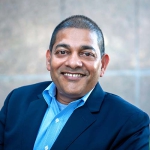 Saurajit is passionate about helping customers realize consistent value from their investments in technology. He has a strong background in conducting technology strategy, business systems planning, software/vendor selection, solution architecture, and project/program management. Saurajit has program managed large scale multi-year, multi-million dollar digital transformation initiatives. He has also spearheaded multiple long-term business systems roadmap efforts.
Saurajit is passionate about helping customers realize consistent value from their investments in technology. He has a strong background in conducting technology strategy, business systems planning, software/vendor selection, solution architecture, and project/program management. Saurajit has program managed large scale multi-year, multi-million dollar digital transformation initiatives. He has also spearheaded multiple long-term business systems roadmap efforts.
For information on how to work with Don visit Work With Don WilliamsYou can also reach out to Don Williams at https://donwilliamsglobal.comPlease join Don and his businesses in support of St. Jude’s Children Research Hospital in its Mission to cure Childhood Cancers. You can donate to St. Jude at stjude.org/donate
